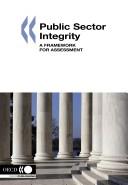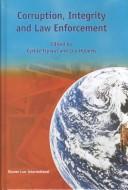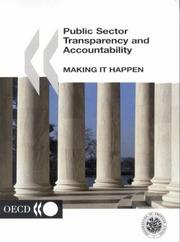| Listing 1 - 10 of 10 |
Sort by
|
Book
ISBN: 9780262538831 0262538830 0262358425 9780262358422 Year: 2020 Publisher: Cambridge, Massachusetts: MIT Press,
Abstract | Keywords | Export | Availability | Bookmark
 Loading...
Loading...Choose an application
- Reference Manager
- EndNote
- RefWorks (Direct export to RefWorks)
"This book explains what corruption is, and how to fight it. Corruption is the use of power in the public sphere for personal gain. Corruption can involve paying a bribe to facilitate a permit application, government contracts for construction or procurement, or by granting special interests influence over government or business proceedings, without cash ever changing hands. The book explores case studies of countries that have successfully managed to stem corruption, and the roles that the judicial system, auditors, ombudspersons, and the media can play in halting corruption. However, Rotberg argues, the essential ingredient to fighting corruption is a leader with the political will to tackle corruption, from whom judges, investigators, and others can take their cues. The book also explores the ways in which technology can stop corruption-moving bureaucratic processes online, for example, eliminates the possibility of being asked for a bribe. The book concludes with a thirteen-step recipe for anticorruption success"--
Book
ISBN: 9264187200 9264187197 Year: 2013 Publisher: Paris : OECD,
Abstract | Keywords | Export | Availability | Bookmark
 Loading...
Loading...Choose an application
- Reference Manager
- EndNote
- RefWorks (Direct export to RefWorks)
This report provides a comparative overview of common standards and key features of specialised anti-corruption institutions and comprehensive descriptions of 19 anti-corruption institutions operating in different parts of the world, presented in a comparable framework. This new edition of an 2008 report reflects the evolving understanding of international standards and the practice and the most recent experiences of anti-corruption institutions. The report discusses three "models" of anti-corruption institutions: multi-functional anti-corruption agencies, institutions fighting corruption through law enforcement and prevention institutions. Encouraged by international conventions and success of some specialised anti-corruption institutions in earlier times, such as the Hong Kong’s anti-corruption commission, many countries around the world, including those in Eastern Europe, have created new specialised institutions to prevent and combat corruption over the past decade. Establishing such bodies was often seen as the only way to reduce widespread corruption, as existing institutions were considered too weak for the task, or were considered to be part of the corruption-problem. The report highlights that while many of these new anti-corruption agencies have shown good results, they cannot fight corruption alone. Other public institutions, including various specialised integrity and control bodies, and internal units in various public institutions should play a role in preventing and detecting corruption in different sectors of public administration.
Corrupción -- Prevención. --- Corruption -- Government policy -- Evaluation. --- Corruption -- Prevention. --- Political corruption -- Government policy -- Evaluation. --- Political corruption -- Prevention. --- Public administration -- Corrupt practices -- Prevention. --- Corruption --- Political corruption --- Prevention. --- Government policy --- Evaluation.
Book
ISBN: 9781780680927 1780680929 Year: 2012 Publisher: Cambridge: Intersentia,
Abstract | Keywords | Export | Availability | Bookmark
 Loading...
Loading...Choose an application
- Reference Manager
- EndNote
- RefWorks (Direct export to RefWorks)
Public administration --- Criminal law. Criminal procedure --- International law --- corruptie --- Political corruption --- Corruption (Politique) --- Prevention. --- Prevention --- International cooperation. --- Prévention --- Coopération internationale --- International cooperation --- 343.35 --- Delicten en fraude tegen het openbaar bestuur: omkoperij, machtsmisbruik, aanmatiging van functies, aanmatiging van titels, fraude bij openbare leveringen, administratieve fraude, fiscale fraude --- 343.35 Delicten en fraude tegen het openbaar bestuur: omkoperij, machtsmisbruik, aanmatiging van functies, aanmatiging van titels, fraude bij openbare leveringen, administratieve fraude, fiscale fraude --- Prévention --- Coopération internationale --- Boss rule --- Corruption (in politics) --- Graft in politics --- Malversation --- Political scandals --- Politics, Practical --- Corruption --- Misconduct in office --- Prevention&delete& --- Corrupt practices --- Government policy --- Political corruption - Prevention --- Political corruption - Prevention - International cooperation --- Corruption politique --- Politique publique
Book
ISBN: 9264226621 926422663X Year: 2014 Publisher: Paris : OECD Publishing,
Abstract | Keywords | Export | Availability | Bookmark
 Loading...
Loading...Choose an application
- Reference Manager
- EndNote
- RefWorks (Direct export to RefWorks)
Ce rapport essaie de quantifier, et de décrire la corruption transnationale sur la base des informations révélées dans les 427 affaires de corruption transnationale terminées depuis l’entrée en vigueur de la Convention de l’OCDE sur la lutte contre la corruption en 1999.
Bribery -- Prevention. --- Political corruption -- Prevention. --- Social Welfare & Social Work --- Social Sciences --- Criminology, Penology & Juvenile Delinquency --- Bribery --- Political corruption --- Prevention. --- Boss rule --- Corruption (in politics) --- Graft in politics --- Malversation --- Political scandals --- Politics, Practical --- Corrupt practices --- Corruption --- Misconduct in office --- White collar crimes

ISBN: 1280356790 9786610356799 9264010602 9264010599 9789264010604 Year: 1973 Publisher: PARIS: OCDE,
Abstract | Keywords | Export | Availability | Bookmark
 Loading...
Loading...Choose an application
- Reference Manager
- EndNote
- RefWorks (Direct export to RefWorks)
This assessment framework for public sector integrity provides policy makers and managers with a pioneering roadmap to design and organise sound assessments in specific public organisations and sectors. It includes practical checklists, decision-making tools and options for methodologies based on good practices. At a time when governments are increasingly required to assess pro-integrity and corruption prevention measures, this report provides a unique inventory of methods and solutions used world wide for crafting well-designed assessments. Selected case studies give more details on recent assessments in the specific country contexts of Australia, Finland, France and Korea.
Civil service ethics -- Evaluation. --- Political corruption -- Prevention -- Case studies. --- Public administration -- Moral and ethical aspects -- Evaluation. --- Civil service ethics --- Public administration --- Political corruption --- Evaluation. --- Moral and ethical aspects --- Prevention --- Boss rule --- Corruption (in politics) --- Graft in politics --- Malversation --- Political scandals --- Politics, Practical --- Administration, Public --- Delivery of government services --- Government services, Delivery of --- Public management --- Public sector management --- Civil service --- Corrupt practices --- Ethics --- Corruption --- Misconduct in office --- Political science --- Administrative law --- Decentralization in government --- Local government --- Public officers --- Political ethics
Book
ISBN: 0821397966 0821397974 Year: 2013 Publisher: Washington, D.C. : World Bank,
Abstract | Keywords | Export | Availability | Bookmark
 Loading...
Loading...Choose an application
- Reference Manager
- EndNote
- RefWorks (Direct export to RefWorks)
Income and asset disclosure systems (IAD) are gaining prominence as a tool in the fight against corruption, and have the potential to support efforts in both prevention and enforcement. They are intended to prevent and help detect the use of public office for private gain, and to help build a climate of integrity in public administration by detecting and helping officials avoid potential conflicts of interest. The potential for IAD systems to contribute to broader anticorruption efforts--such as national and international financial investigations and prosecutions, international asset recovery
Financial disclosure -- Case studies. --- Financial disclosure -- Law and legislation -- Case studies. --- Political corruption --Prevention -- Case studies. --- Political corruption --- Financial disclosure --- Government - General --- Law, Politics & Government --- Political Institutions & Public Administration - General --- Prevention --- Law and legislation --- Disclosure of personal finances --- Government in the sunshine --- Sunshine, Government in the --- Boss rule --- Corruption (in politics) --- Graft in politics --- Malversation --- Political scandals --- Politics, Practical --- Corrupt practices --- Disclosure of information --- Corruption --- Misconduct in office
Book
ISBN: 9780415466950 0415466954 9780203891971 020389197X 9780415599610 9781134035410 9781134035458 9781134035465 Year: 2008 Volume: 55 Publisher: New York: Routledge,
Abstract | Keywords | Export | Availability | Bookmark
 Loading...
Loading...Choose an application
- Reference Manager
- EndNote
- RefWorks (Direct export to RefWorks)
Political corruption --- Non-governmental organizations. --- INGOs (International agencies) --- International non-governmental organizations --- NGOs (International agencies) --- Nongovernmental organizations --- Organizations, Non-governmental (International agencies) --- Private and voluntary organizations (International agencies) --- PVOs (International agencies) --- International agencies --- Nonprofit organizations --- Boss rule --- Corruption (in politics) --- Graft in politics --- Malversation --- Political scandals --- Politics, Practical --- Corruption --- Misconduct in office --- Prevention. --- Corrupt practices --- Public administration --- Political sociology --- Non-governmental organizations --- Prevention --- Political corruption - Prevention

ISBN: 9789041118660 9789004481213 9041118667 Year: 2002 Publisher: The Hague : Kluwer law international,
Abstract | Keywords | Export | Availability | Bookmark
 Loading...
Loading...Choose an application
- Reference Manager
- EndNote
- RefWorks (Direct export to RefWorks)
Integrity and corruption have become important issues in the practice and theory of politics, public administration, law, economics and social life. Consequently, they have also become significant topics for law enforcement organisations. Indeed, these organisations play a crucial role in the struggle against corruption in society, and, in order to do that, their own integrity must be beyond doubt. This volume, with contributions by 35 authors from 13 countries in five continents, offers a comprehensive overview of "corruption, integrity and law enforcement". The related papers were presented at the Second Global Forum on Fighting Corruption and Safeguarding Integrity that took place in The Hague in May 2001. The content and extent of the problem of corruption are presented via case studies from individual countries. Furthermore, corruption and integrity in the law enforcement system itself are highlighted, and the legal instruments that are available to combat corruption and to safeguard integrity are discussed. Special attention is paid here to independent institutions that operate in several countries. Finally, several contributions focus on the global dimension of the subject: the international organisations and initiatives that play an important role in the world-wide struggle against corruption. This volume is therefore of great relevance for policy makers and academic researchers, as well as for practitioners.
Criminal justice, Administration of --- Law enforcement --- Misconduct in office --- Police corruption --- Judicial corruption --- Political corruption --- Corruption investigation --- Prevention --- Boss rule --- Corruption (in politics) --- Graft in politics --- Malversation --- Political scandals --- Politics, Practical --- Corruption --- Police --- Police misconduct --- Malfeasance in office --- Misfeasance in office --- Official misconduct --- Administrative responsibility --- Enforcement of law --- Policing --- Criminal investigation --- Corrupt practices --- Criminal justice, Administration of - Congresses --- Law enforcement - Congresses --- Misconduct in office - Prevention - Congresses --- Police corruption - Prevention - Congresses --- Judicial corruption - Prevention - Congresses --- Political corruption - Prevention - Congresses --- Corruption investigation - Congresses

ISBN: 1280033711 9786610033713 9264176284 926419830X Year: 2002 Publisher: Paris : OECD,
Abstract | Keywords | Export | Availability | Bookmark
 Loading...
Loading...Choose an application
- Reference Manager
- EndNote
- RefWorks (Direct export to RefWorks)
High standards of public governance are the essential foundation for achieving sustainable economic growth and social cohesion. This publication presents the papers discussed at the Latin American Forum on Ensuring Transparency and Accountability in the Public Sector that took place on 5-6 December 2001. The Forum brought together more than 450 ministers, senators, senior government officials, business leaders, representatives of international organisations, non-government organisations and the media from OECD countries, Latin America and the Caribbean. The Forum approved policy recommendations that reflect the shared experience of Member countries of the OECD and the Organization of American States. The agreed policy recommendations list key principles and crucial factors in the three following key areas of good governance: - Ensuring impartiality in the decision-making process by a credible conflict-of-interest policy.- Increasing transparency in the preparation and execution of the budget.- Promoting freedom of information, consultation and participation of citizens in the formulation and implementation of public policies. In addition, country papers provide practical solutions adapted to their particular administrative environments for policy-makers and a demanding civil society.
Civil service ethics -- Congresses. --- Political corruption -- Prevention -- Congresses. --- Public administration -- Moral and ethical aspects -- Congresses. --- Civil service ethics --- Public administration --- Political corruption --- Government - General --- Law, Politics & Government --- Political Institutions & Public Administration - General --- Moral and ethical aspects --- Prevention --- Administration, Public --- Delivery of government services --- Government services, Delivery of --- Public management --- Public sector management --- Civil service --- Ethics --- Political science --- Administrative law --- Decentralization in government --- Local government --- Public officers --- Political ethics --- Boss rule --- Corruption (in politics) --- Graft in politics --- Malversation --- Political scandals --- Politics, Practical --- Corruption --- Misconduct in office --- Corrupt practices --- Administration publique (Science)
Book
ISBN: 9781107113923 9781316286937 9781107534575 1107534577 110711392X 1316435326 1316430359 1316286932 9781316430354 9781316435328 Year: 2015 Publisher: Cambridge, England : Cambridge University Press,
Abstract | Keywords | Export | Availability | Bookmark
 Loading...
Loading...Choose an application
- Reference Manager
- EndNote
- RefWorks (Direct export to RefWorks)
Why do some societies manage to control corruption so that it manifests itself only occasionally, while other societies remain systemically corrupt? This book is about how societies reach that point when integrity becomes the norm and corruption the exception in regard to how public affairs are run and public resources are allocated. It primarily asks what lessons we have learned from historical and contemporary experiences in developing corruption control, which can aid policy-makers and civil societies in steering and expediting this process. Few states now remain without either an anticorruption agency or an Ombudsman, yet no statistical evidence can be found that they actually induce progress. Using both historical and contemporary studies and easy to understand statistics, Alina Mungiu-Pippidi looks at how to diagnose, measure and change governance so that those entrusted with power and authority manage to defend public resources.
POLITICAL CORRUPTION--PREVENTION --- PUBLIC ADMINISTRATION--CORRUPT PRACTICES-- PREVENTION --- GOVERNMENT ACCOUNTABILITY --- TRANSPARENCY IN GOVERNMENT --- Political corruption --- Public administration --- Government accountability --- Transparency in government --- Government in the sunshine --- Open government (Transparency in government) --- Openness in government --- Sunshine, Government in the --- Transparence in government --- Accountability in government --- Responsibility --- Administration, Public --- Delivery of government services --- Government services, Delivery of --- Public management --- Public sector management --- Political science --- Administrative law --- Decentralization in government --- Local government --- Public officers --- Boss rule --- Corruption (in politics) --- Graft in politics --- Malversation --- Political scandals --- Politics, Practical --- Corruption --- Misconduct in office --- Prevention --- Corrupt practices&delete& --- Corrupt practices --- Government accountability. --- Transparency in government. --- Prevention.
| Listing 1 - 10 of 10 |
Sort by
|

 Search
Search Feedback
Feedback About UniCat
About UniCat  Help
Help News
News